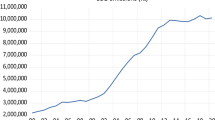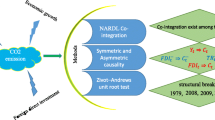Abstract
Giving that People’s Republic of China is one of the two new frontiers of globalization, the country has continued to contend with the bottleneck of sustaining its economic growth amidst environmental hiccups arising from the drawbacks of globalization and energy consumption. By investigating the challenges of the country’s drive toward environmental sustainability, the present study offers a new perspective on the role of electricity consumption and economic growth in a carbon-income function setting. This study also incorporates globalization into CO2 emissions equation for the experimental period of 1970–2014. Stationarity properties were ascertained by the Zivot and Andrew unit root test under a single structural break. Subsequently, the recent and novel combined cointegration test of Bayer and Hanck (2013) in conjunction with the Pesaran bounds testing approach is used to establish a cointegration relationship among the selected variables. Finally, the modified Wald test of the Toda-Yamamoto Granger causality test is employed to detect the direction of causality flows among the variables. Empirical piece of evidence finds a statistically positive correlation between electricity consumption and economic growth as seen in the long-run regression. This result is also affirmed by the Granger causality test. The test corroborates with the electricity-induced growth hypothesis in the case of China. However, there is an environmental trade-off, as more electricity consumptions spur increased carbon dioxide emissions (CO2). Our study finds empirical support that globalization reduced pollutant emissions in both the short and long run over our sampled period. Based on these results and outcomes, several policy prescriptions on the energy-income and environment nexus are renders for policymakers. Among such policy recommendations are (a) the need for the diversification of the Chinese energy mix to cleaner energy sources and renewables and (b) the need for decarbonization and adoption of carbon capturing and storage technologies.



Similar content being viewed by others
Notes
The United Nations Framework Convention on Climate Change (UNFCC) is the United Nations organization that is saddle with the global climate actions. Further information on UNFCCC is available at https://unfccc.int/.
The Paris Agreement is the United Nations Framework Convention on Climate Change of 2015. More details relating to the Paris Agreement of 2015 are available at: https://unfccc.int/process/conferences/pastconferences/ paris-climate-change-conference-november-2015/ Paris-agreement.
For clarity sake to avoid repetition the use of China refers to People’s Republic of China
The Bayer and Hanck cointegration test is preferred to other forms of cointegration tests, since it combines several individual cointegration test outcomes to generate a more robust comovement outcomes.
References
Ahmed Z, Wang Z, Ali S (2019) Investigating the non-linear relationship between urbanization and CO 2 emissions: an empirical analysis. Air Qual Atmos Health 12(8):945–953
Al-Mulali U, Tang CF, Tan BW, Ozturk I (2019) The nexus of electricity consumption and economic growth in gulf cooperation council economies: evidence from non-stationary panel data methods. Geosyst Eng 22(1):40–47
Alola AA (2019a) The trilemma of trade, monetary and immigration policies in the United States: accounting for environmental sustainability. Sci Total Environ 658:260–267
Alola AA (2019b) Carbon emissions and the trilemma of trade policy, migration policy and health care in the US. Carbon Manag 10(2):209–218
Alola AA, Alola UV (2018) Agricultural land usage and tourism impact on renewable energy consumption among coastline Mediterranean countries. Energy Environ 29(8):1438–1454
Alola AA, Alola UV, Saint Akadiri S (2019a) Renewable energy consumption in coastline Mediterranean countries: impact of environmental degradation and housing policy. Environ Sci Pollut Res:1–13
Alola AA, Bekun FV, Sarkodie SA (2019b) Dynamic impact of trade policy, economic growth, fertility rate, renewable and non-renewable energy consumption on ecological footprint in Europe. Sci Total Environ 685:702–709
Balcilar M, Bekun FV, Uzuner G (2019) Revisiting the economic growth and electricity consumption nexus in Pakistan. Environ Sci Pollut Res 26(12):12158–12170
Banerjee A, Dolado J, Mestre R (1998) Error‐correction mechanism tests for cointegration in a single‐equation framework. J Time Ser Anal 19(3):267–283
Bayer C, Hanck C (2013) Combining non‐cointegration tests. J Time Ser Anal 34(1):83–95
Bekun FV, Agboola MO (2019) Electricity consumption and economic growth Nexus: evidence from Maki cointegration. Eng Econ 30(1):14–23
Bekun FV, Alola AA, Sarkodie SA (2019a) Toward a sustainable environment: Nexus between CO2 emissions, resource rent, renewable and nonrenewable energy in 16-EU countries. Sci Total Environ 657:1023–1029
Bekun FV, Emir F, Sarkodie SA (2019b) Another look at the relationship between energy consumption, carbon dioxide emissions, and economic growth in South Africa. Sci Total Environ 655:759–765
Boswijk HP (1995) Efficient inference on cointegration parameters in structural error correction models. J Econ 69(1):133–158
Central Intelligence Agency, CIA (2019). https://www.cia.gov/library/publications/the-world-factbook/geos/ch.html. Retrieved 10 Jul 2019
Chen ZM, Chen GQ (2011) An overview of energy consumption of the globalized world economy. Energy Policy 39(10):5920–5928
Cowan WN, Chang T, Inglesi-Lotz R, Gupta R (2014) The nexus of electricity consumption, economic growth and CO2 emissions in the BRICS countries. Energy Policy 66:359–368
Ding T, Ning Y, Zhang Y (2018) The contribution of China’s bilateral trade to global carbon emissions in the context of globalization. Struct Chang Econ Dyn 46:78–88
Emir F, Bekun FV (2019) Energy intensity, carbon emissions, renewable energy, and economic growth nexus: new insights from Romania. Energy Environ 30(3):427–443
Engle RF, Granger CW (1987) Co-integration and error correction: representation, estimation, and testing. Econometrica: Journal of the Econometric Society 251–276
Global Economic Dynamics (2019). The pros and cons of globalization. https://ged-project.de/allgemein-en/the-pros-and-cons-of-globalization/. Retrieved 10 Jul 2019
Gokmenoglu KK, Taspinar N (2018) Testing the agriculture-induced EKC hypothesis: the case of Pakistan. Environ Sci Pollut Res 25(23):22829–22841
Govindaraju VC, Tang CF (2013) The dynamic links between CO2 emissions, economic growth and coal consumption in China and India. Appl Energy 104:310–318
International Energy Agency, IEA (2019). Global Energy and CO2 Status Report. https://www.iea.org/geco/emissions/. Retrieved 13 Jul 2019
Johansen S (1991) Estimation and hypothesis testing of cointegration vectors in Gaussian vector autoregressive models. Econometrica 59(6):1551–1580
Karimo T, Ogbonna O (2017) Financial deepening and economic growth nexus in Nigeria: supply-leading or demand-following? Economies 5(1):4
Kharrazi A, Sato M, Yarime M, Nakayama H, Yu Y, Kraines S (2015) Examining the resilience of national energy systems: measurements of diversity in production-based and consumption-based electricity in the globalization of trade networks. Energy Policy 87:455–464
Kraft J, Kraft A (1978) On the relationship between energy and GNP. J Energy Dev:401–403
Meckling J (2011) The globalization of carbon trading: transnational business coalitions in climate politics. Global Environ Politics 11(2):26–50
Ou X, Xiaoyu Y, Zhang X (2011) Life-cycle energy consumption and greenhouse gas emissions for electricity generation and supply in China. Appl Energy 88(1):289–297
Pesaran MH, Shin Y, Smith JR (2001) Bounds testing approaches to the analysis of level relationships. J Appl Econom 16(3):289–326
Rui H (2005) Development, transition and globalization in China's coal industry. Dev Chang 36(4):691–710
Saint Akadiri S, Alola AA, Akadiri AC (2019a) The role of globalization, real income, tourism in environmental sustainability target. Evidence from Turkey. Sci Total Environ
Saint Akadiri S, Bekun FV, Sarkodie SA (2019b) Contemporaneous interaction between energy consumption, economic growth and environmental sustainability in South Africa: what drives what? Sci Total Environ 686:468–475
Saint Akadiri S, Alola AA, Akadiri AC, Alola UV (2019c) Renewable energy consumption in EU-28 countries: policy toward pollution mitigation and economic sustainability. Energy Policy 132:803–810
Saint Akadiri S, Alkawfi MM, Uğural S, Akadiri AC (2019d) Towards achieving environmental sustainability target in Italy. The role of energy, real income and globalization. Sci Total Environ 671:1293–1301
Salahuddin M, Alam K, Ozturk I, Sohag K (2018) The effects of electricity consumption, economic growth, financial development and foreign direct investment on CO2 emissions in Kuwait. Renew Sust Energ Rev 81:2002–2010
Samu R, Bekun FV, Fahrioglu M (2019) Electricity consumption and economic growth nexus in Zimbabwe revisited: fresh evidence from Maki cointegration. Int J Green Energy 16(7):540–550
Shahbaz M, Sinha A (2019) Environmental Kuznets curve for CO2 emissions: a literature survey. J Econ Stud 46(1):106–168
Shahbaz M, Khan S, Ali A, Bhattacharya M (2017a) The impact of globalization on CO2 emissions in China. Singapore Econ Rev 62(04):929–957
Shahbaz M, Benkraiem R, Miloudi A, Lahiani A (2017b) Production function with electricity consumption and policy implications in Portugal. Energy Policy 110:588–599
Shahbaz M, Shahzad SJH, Mahalik MK (2018) Is globalization detrimental to CO 2 emissions in Japan? New threshold analysis. Environ Model Assess 23(5):557–568
Shahbaz M, Mahalik MK, Shahzad SJH, Hammoudeh S (2019) Testing the globalization-driven carbon emissions hypothesis: international evidence. Int Econ 158:25–38
Shahzad SJH, Kumar RR, Zakaria M, Hurr M (2017) Carbon emission, energy consumption, trade openness and financial development in Pakistan: a revisit. Renew Sust Energ Rev 70:185–192
Soytas U, Sari R (2009) Energy consumption, economic growth, and carbon emissions: challenges faced by an EU candidate member. Ecol Econ 68(6),:1667–1675
The World Bank (2019). The World Bank in China. https://www.worldbank.org/en/country/china/overview. Retrieved 10 Jul 2019
Toda HY, Yamamoto T (1995) Statistical inference in vector autoregressions with possibly integrated processes. J Econ 66(1–2):225–250
United Nations Framework Convention on Climate Change (UNFCC). https://unfccc.int/. Retrieved 13 Jul 2019
You W, Lv Z (2018) Spillover effects of economic globalization on CO2 emissions: a spatial panel approach. Energy Econ 73:248–257
Zhang M, Liu X, Wang W, Zhou M (2013) Decomposition analysis of CO2 emissions from electricity generation in China. Energy Policy 52:159–165
Zivot E, Andrews DWK (1992) Further evidence on the Great Crash, the oil price shock, and the unit root hypothesis. Journal of Business and Economic Statistics 10(3):251–270
Author information
Authors and Affiliations
Corresponding author
Additional information
Responsible editor: Eyup Dogan
Publisher’s note
Springer Nature remains neutral with regard to jurisdictional claims in published maps and institutional affiliations.
Rights and permissions
About this article
Cite this article
Akadiri, S.S., Alola, A.A., Bekun, F.V. et al. Does electricity consumption and globalization increase pollutant emissions? Implications for environmental sustainability target for China. Environ Sci Pollut Res 27, 25450–25460 (2020). https://doi.org/10.1007/s11356-020-08784-3
Received:
Accepted:
Published:
Issue Date:
DOI: https://doi.org/10.1007/s11356-020-08784-3




